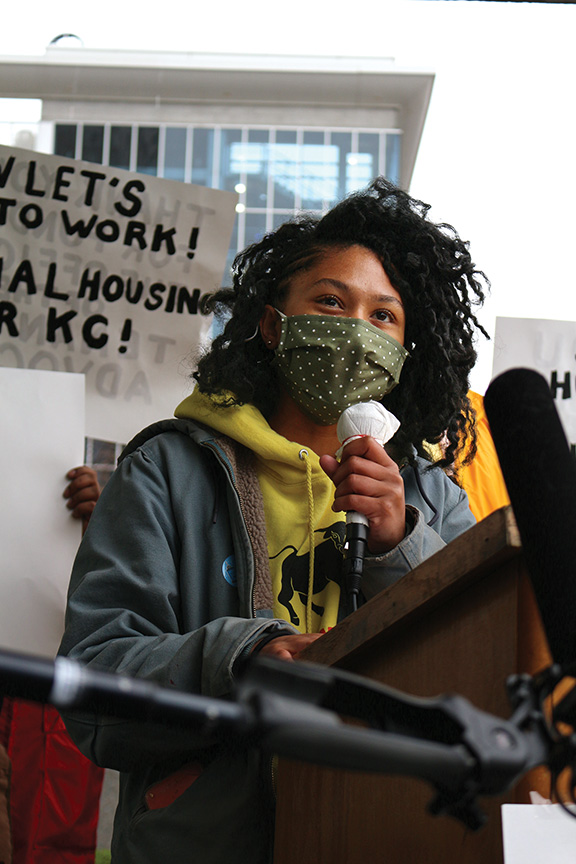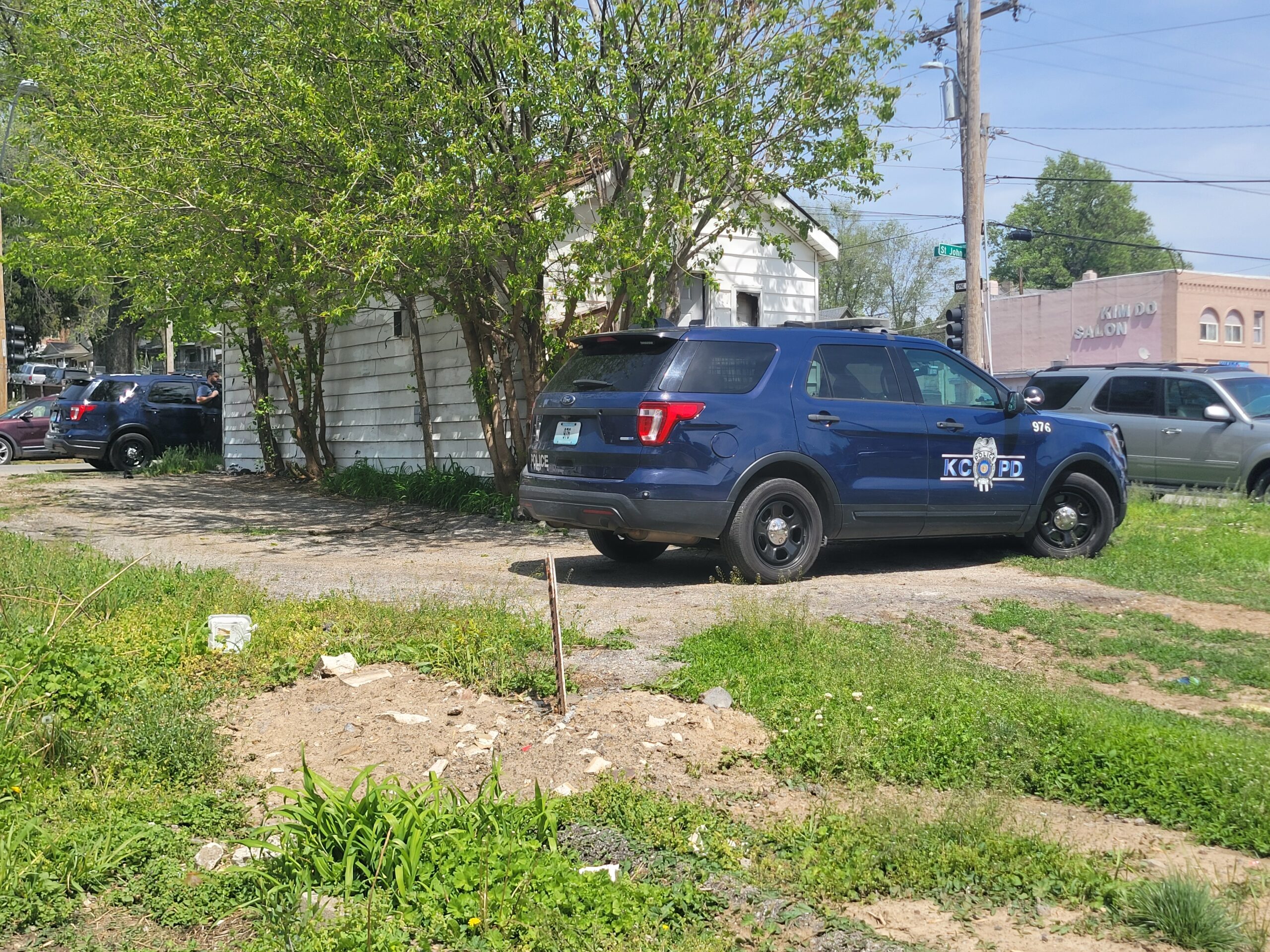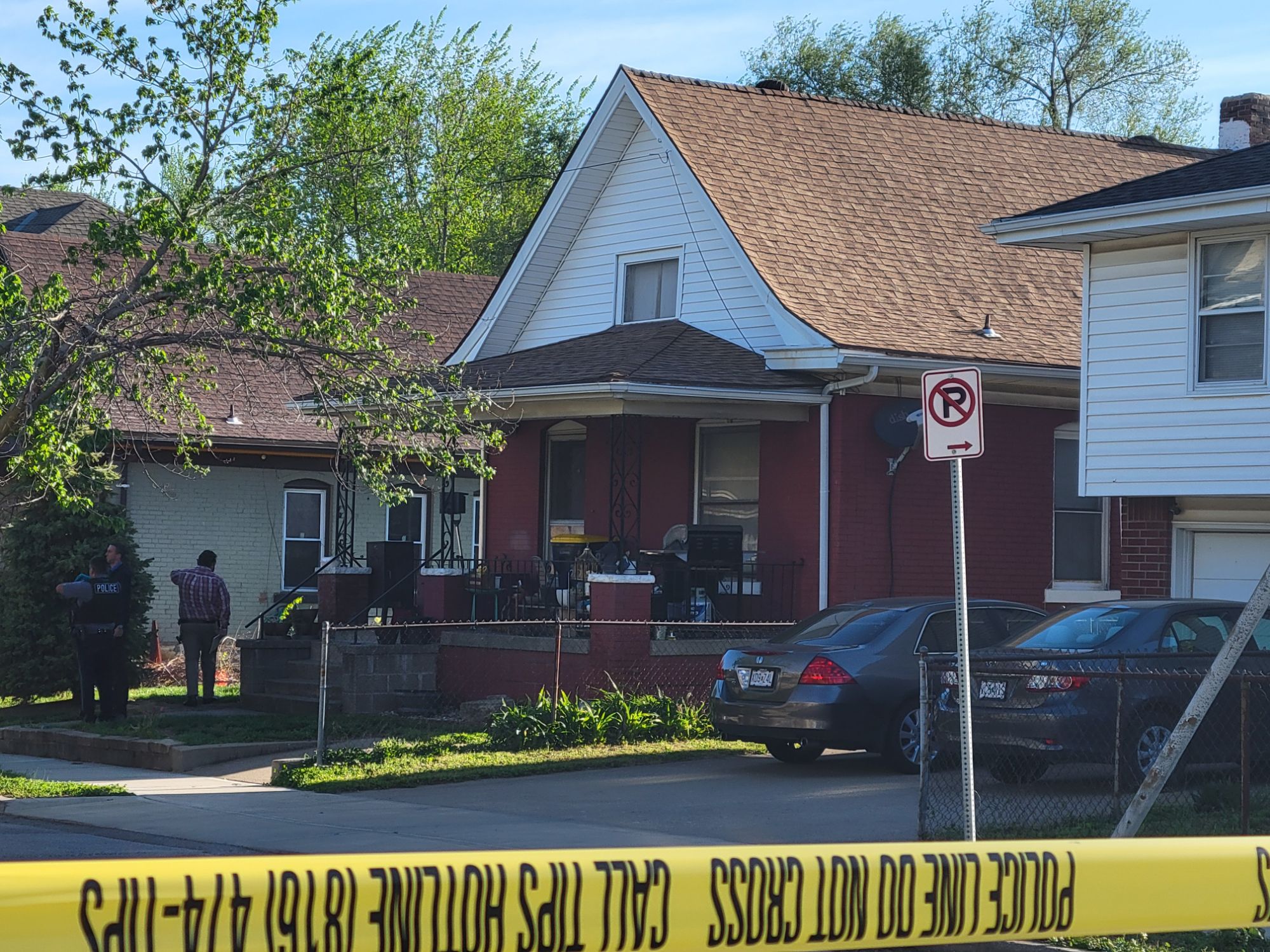
Abby Hoover
Managing Editor
On Thursday, March 25, as the Kansas City, Mo., City Council prepared to approve the Fiscal Year 2021-22 budget, organizers from KC Tenants voiced their support of full funding for the Office of the Tenant Advocate on the steps of City Hall.
In December 2019, KC Tenants won a historic Tenants Bill of Rights for Kansas City. Since that law went into effect in June 2020, KC Tenants has advocated for full funding for the Office of the Tenant Advocate, the office empowered to enforce the Tenants Bill of Rights.
The mayor and city council adopted the budget hours later, including $931,495 to fund the Office of the Tenant Advocate, supplementing the proposed level with $820,000 from federal resources. KC Tenants was well represented at each budget hearing this year, voicing their support for the office they had been promised, but had yet to be funded. KC Tenants leaders shared testimonies about rights violations, evictions and poor housing conditions, and called out the massive difference between the tenant advocacy budget and the police budget.
“As a direct result of our vision, organizing, and public testimony, the City Council adopted a budget that adequately funds an Office of the Tenant Advocate for the first time in our City’s history,” said Diane Charity, a leader with KC Tenants. “We are not done. Our campaign for a Tenants Bill of Rights was about accountability. In the coming weeks, we’re about to launch a campaign about affordability.”
Jordan Ayala, a leader with KC Tenants and second generation Mexican American, said the council’s plans to create a standalone housing department are a step in the right direction, but tenants need to be at the table.
“We need to ensure that the housing department works for the people, not for developer and landlord profits,” Ayala said. “KC Tenants intends to do just that.”
The activist group, which fights for tenant rights and safe housing in Kansas City, previewed its campaign for a Housing Trust Fund that “puts people before profit.” While the campaign for a fully funded Office of the Tenant Advocate was centered on accountability, the Housing Trust Fund will focus on affordability.
The intent behind KC Tenants’ Housing Trust Fund proposal, designed by poor and working class tenants, is to move Kansas City toward truly safe, accessible and permanently affordable homes for all.
“Kansas City’s housing crisis is multifaceted and systemic, requiring multifaceted and systemic solutions. Like most cities in America, Kansas City treats housing as a commodity, something to be bought, sold, and rented in a private market,” said Jenay Manley, a leader with KC Tenants. “Kansas City does not approach housing policy by considering housing a human right. This distinction means that our policymaking tends to prioritize landlord and developer profits over tenants’ homes.”
KC Tenants has declared 2021 the Year of the Tenant, and Ayala said they look forward to working closely with members of the city council to make the Housing Trust Fund a reality in Kansas City.
“The past year has been challenging, and, like many American cities, the economic slowdown caused by the COVID-19 pandemic has resulted in significant revenue reductions for Kansas City — which has required tough financial decisions to balance our budget while continuing to provide basic City services for all Kansas City neighborhoods,” Mayor Quinton Lucas said. “I am proud that the Kansas City Council today passed our responsible budget, which cuts inefficiencies, prioritizes pothole filling and street repair, fully funds the Office of the Tenant Advocate and assistance for affordable housing, and keeps our promise to protect our City workforce so that no City employee will lose their job due to budget cuts.”
Also in the budget, the City Council voted to add back several programs, including $400,000 to continue mowing rural areas, that had been cut from the proposed budget submitted on Feb. 11.
The City will receive $195 million in federal COVID-19 relief funds that will help replenish the reserves spent to cope with the $70 million shortfall induced by the pandemic. The budget also looks at making many city services more efficient and cost effective.
“In addition to pouring money back into some areas facing deeper cuts, this budget includes investments of substantial resources into priority areas like,” according to the City’s announcement.
These include expanded snow removal operations, improving equity to help build a more inclusive workplace that includes the City’s first Chief Equity Officer and additional staff to both expand professional development and employee training, creating the City’s first Transportation Director and other resources to help aggressively redesign streets to reduce traffic deaths and serious injuries, and funding for continued COVID-19 response.
“I will continue working with my colleagues to ensure federal stimulus funds received by the City supplement our ongoing efforts to ensure equity in housing, to pick up the trash and clean our city, and support our continued COVID-19 response efforts,” Lucas said.
The council made another decision to help KCMO residents and businesses deal with tighter finances by changing the date for filing, paying and requesting extensions for earnings and profits taxes for 2020 to May 17, 2021; and delaying the accrual of any penalty and interest. This move matches the change just announced by the federal government.
In the recent Annual Resident Survey, Kansas Citians prioritized funding public safety, capital improvements and transportation.
The adopted budget closes the budget shortfall with strategic cuts and adjustments, which include transitioning to “in-house” waste removal and leaf and brush collection services; negotiating reductions in healthcare costs for the city and auditing existing coverage to ensure cost effectiveness; converting streetlights to lower cost, energy-efficient LED lights; right-sizing the KCPD budget to match current staffing and consolidating services to improve efficiencies; voluntary retirement incentive; sale of unused city property, refinancing debt; reducing contracts with outside vendors including security guards, jail contracts, and lobbyists; identifying new ways to increase revenue collections through EMS, courts, and tax offices; closing the Hale Arena, which costs the city $1.7 million a year to maintain.


















